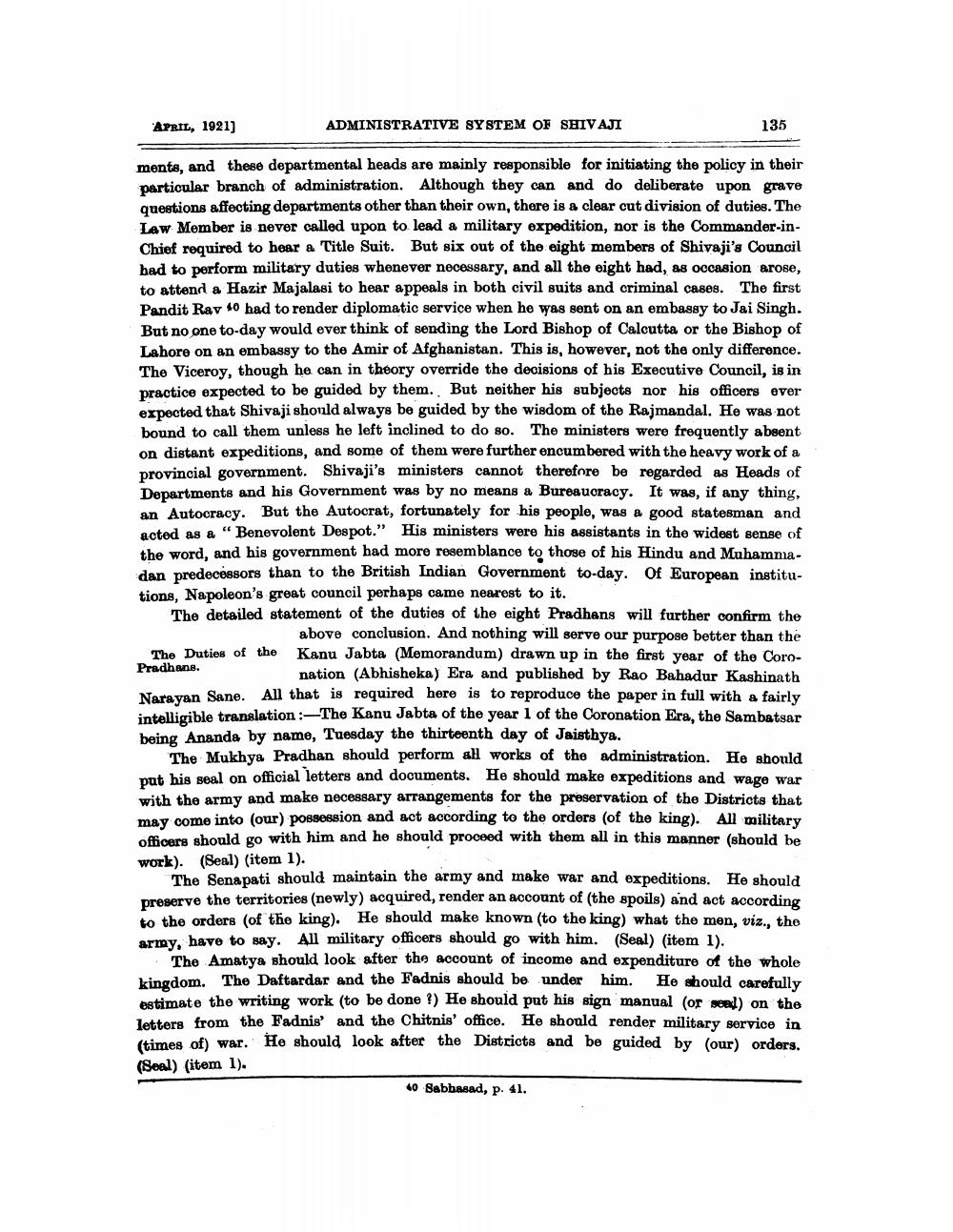________________
APRIL, 1921)
ADMINISTRATIVE SYSTEM OF SHIVAJI
135
ments, and these departmental heads are mainly responsible for initiating the policy in their particular branch of administration. Although they can and do deliberate upon grave questions affecting departments other than their own, there is a clear cut division of duties. The Law Member is never called upon to lead a military expedition, nor is the Commander-inChief required to hear a Title Suit. But six out of the eight members of Shivaji's Council had to perform military duties whenever necessary, and all the eight had, as occasion arose, to attend a Hazir Majalasi to hear appeals in both civil suits and criminal cases. The first Pandit Rav 40 had to render diplomatic service when he was sent on an embassy to Jai Singh. But no one to-day would ever think of sending the Lord Bishop of Calcutta or the Bishop of Labore on an embassy to the Amir of Afghanistan. This is, however, not the only difference. The Viceroy, though he can in theory override the decisions of his Executive Council, is in practice expected to be guided by them. But neither his subjects nor his officers over expected that Shivaji should always be guided by the wisdom of the Rajmandal. He was not bound to call them unless he left inclined to do so. The ministers were frequently absent on distant expeditions, and some of them were further encumbered with the heavy work of a provincial government. Shivaji's ministers cannot therefore be regarded as Heads of Departments and his Government was by no means a Bureaucracy. It was, if any thing, an Autocracy. But the Autocrat, fortunately for his people, was a good statesman and acted as a "Benevolent Despot." His ministers were his assistants in the widest sense of the word, and his government had more resemblance to those of his Hindu and Muhammadan predecessors than to the British Indian Government to-day. Of European institutions, Napoleon's great council perhaps came nearest to it. The detailed statement of the duties of the eight Pradhans will further confirm the
above conclusion. And nothing will serve our purpose better than the The Duties of the Kanu Jabta (Memorandum) drawn up in the first year of the CoroPradhans.
nation (Abhisheka) Era and published by Rao Bahadur Kashinath Narayan Sane. All that is required here is to reproduce the paper in full with a fairly intelligible translation: The Kanu Jabta of the year 1 of the Coronation Era, the Sambatsar being Ananda by name, Tuesday the thirteenth day of Jaisthya.
The Mukhya Pradhan should perform all works of the administration. He should put his seal on official letters and documents. He should make expeditions and wage war with the army and make necessary arrangements for the preservation of the Districts that may come into (our) possession and act according to the orders (of the king). All military
should go with him and he should proceed with them all in this manner (should be work). (Seal) (item 1).
The Senapati should maintain the army and make war and expeditions. He should preserve the territories (newly) acquired, render an account of (the spoils) and act according to the orders (of the king). He should make known (to the king) what the men, viz., the army, have to say. All military officers should go with him. (Seal) (item 1).
The Amatya should look after the account of income and expenditure of the whole Kingdom. The Daftardar and the Fadnis should be under him. He should carefully estimate the writing work (to be done ?) He should put his sign manual (or seal) on the letters from the Fadnis' and the Chitnis' office. He should render military service in (times of) war. He should look after the Districts and be guided by (our) orders. (Soal) (item 1).
40 Sabbasad, p. 41.




